We were just at Office Nomads, a popular coworking space and community builder in Seattle, talking with friends and business partners Susan and Jacob. This past year, they’ve become our friends as well, which will perhaps be obvious when you hear the first question asked…
Susan: Did you hear that Fisher got a puppy?
Lori: I saw the pictures. So freakin’ cute.
Susan: So great.
Lori: [to Daniel] Oh, you started already! [to Susan and Jacob] Hi! It’s nice to do this with people we already know. So, we’re here to interview you for Different Office.
Susan: Yay!
Lori: Because I recognized that this is a self-created, soul-satisfying work space. And I think we’re going to have Daniel come back another day and get some pictures of Chelsea and Alex, because to me it feels like.
Susan: They’re like half the soul.
Lori: Yeah, they’re half the soul. They’re half the self-created part too. And they’re just cool.
Lori: So, first question is:
What work is done in the space?
Jacob: What work is done in the space? There’s all sorts of work that’s done here. That’s what’s great about it. [Lori laughs.]
There’s the obvious answer, that there are a variety of occupations that are here, which spans the gamut. We don’t specifically cater to any particular occupation or group or industry. And that brings a lot of energy into the space, because there’s a lot of variety in the space and that just makes it interesting.
Then there are the non-tangible things—which I think are even more important—which are the connections that people make. And we’ve been putting a lot of thought lately into the nature of connecting with individuals. And [They leap up at the same time to prop a door open near us, because it slams loudly every time someone walks through it, which is often.] And now I’m distracted, so I’m not going to be able to finish that thought. [Lori laughs.]
Lori: Susan, what do you think?
Susan: Oh, well, about the kind of work? I think Jacob answered it pretty well. I think that it’s different every day, which makes it really fun.
Lori: I guess I should have tailored that question to you and asked you:
What work do you do in the space?
Susan: And that’s, it’s the same answer. It’s different every day. I think that we have to be very reactive to the space that we’re in and the individuals that are here. So, some days work means writing a newsletter. Some days work means developing our member management tool to make it better.
Lori: Sending out an email about the flu and staying home from work. [Susan and Lori laugh together.]
Susan: Telling people to stay away from our space right now. Yeah, that’s a great email to send. It’s different, which is why, at least for me personally, it works really well. I like that every day is unexpected and different and fun, and it changes all the time. Today we are repotting the banana plants.
Jacob: And other plants.
Susan: And other plants. But mainly the two giant banana plants that we have, one of which came from The Mill. It just keeps it fresh, keeps it interesting, and it means that anything can happen when you walk in door, which is cool.
Lori: Yeah. I like to work that way too.
How did you end up doing this work?
Jacob: Oh my, well, I started in software. I have always wanted to, always worked on connecting individuals and trying to build communities in various ways. From running a free taxi service in Seattle: trying to connect people literally. And when I bought a house, I bought a house with lots of bedrooms to create a community house. And wanting to apply what I learned there, and in all the various things I’d done, into. Traditionally, when people think about community, and connecting with individuals, it’s “I will go to work and do my thing.” And then after work, and on the weekends, it’s “We can get together.” And it’s putting so much of our energy and passion and drive, so much of our lives, is our work. It’s “Can we use that in a way to get people around each other on a regular basis and basically overcome the barriers to people connecting?”
That’s my vocation today, creating the space.
Lori: And how did you end up doing this work?
Susan: I, for a long time, and still do, walk to work every day. And that walk to work, I think, is how I got here. Just envisioning the city of Seattle, or a neighborhood, on whatever scale you want, that has more people walking. That makes you closer to your community. I think it makes you happier, healthier, all those things. And it was on a walk to work in 2006, I think, that I was thinking about ok, well: how could I possibly help more people walk to work?
Lori: And you ran into Jacob! [We all laugh.]
Susan: No, I was thinking then about what it was like when I worked from home. Whenever I worked from home, women always say that they do laundry, which is true. This is funny, over the years I hear “Oh, if I worked from home I just.” And women, all of them, say, “I just do the laundry and some other things.” I think I catch up on Alias [Lori laughs], and do the laundry, and cook things, whatever. I’m not actually doing as much work as I could be.
So trying to develop a place that feels comfortable, feels like home to work in, but that—at least for me—isn’t my home. I couldn’t do it. Because I would just be busy cleaning stuff and watching Alias.
Lori: Huh. I don’t have that. [belly laughs]
Susan: I’m jealous! I always envisioned.
Daniel: But you haven’t started watching Alias yet. [We laugh.]
Susan: Don’t start, it’s addictive.
I definitely envisioned Office Nomads to be in a house, when I first got started. So it’s so fun having—I know you haven’t asked this question yet—but it’s fun to have another space that looks like that, to me. Because that was more of the vision that I had.
So then Jacob and I. I ran off and went travelling, and I was travelling with a good friend of Jacob’s, it turned out. So when she got home before me, and had coffee with Jacob, and he was talking about this coworking thing, and Office Nomads, and maybe looking for a partner, I was still in Nairobe. And I got this email from Jacob and he’s like “Do you want to be my business partner?” [Jacob laughs.] And I’m like “You’re crazy! Who are you?!” [We all laugh.]
So I said “How about we have coffee first?” And so we had coffee first and like 6 days later we were business partners, pretty much.
Lori: I’m guessing she was pretty strongly vouched for by the mutual friend.
Jacob: Yeah. [Lori laughs.]
Susan: But, I think, it could have. Obviously, we just got really lucky. I think it could have, not everybody.
Lori: You could have not connected.
Susan: Right. And we could have not gotten along. But we did. I think that that’s one thing that we’ve been most fortunate with, is that our partnership has been pretty solid and without much drama or anything else. To start a business with somebody that you didn’t know? I think we have gotten really lucky.
Lori: Yeah. Yeah, I never would have known that had I not asked that question. Because you come across as long-time friends. Well, now you are.
Susan: We’ve had this five years.
Lori: But I would have guessed you as, like, having gone to high school together or something.
Susan: No, but I can tell you a funny story that I would only tell you as the editor of this. Because I don’t normally tell people this. So I looked back, at some point I wondered what the first email between Jacob and I was. This was probably after we’d been in business for a year, and I thought, oh, that’d be a fun thing to do. So I searched through my gmail, and I found the first email, which was not what I thought our first email [she laughs] exchange was. It was–a group of friends and I wanted to do the Solstice Parade, the naked bike ride.
Lori: Yeah.
Susan: And had never gone to it before. But our mutual friend Cat, who connected us, I knew that she’d done it before, so I emailed her. And she said, “Oh, my friend Jacob hosted a painting party at his house every year.” And so our first email was about painting naked bodies [We all start giggling], which is hilarious. I was like “Oh. I guess before we were business partners I got naked in his front yard.” [We start belly laughing.]
Lori: [laughing] That’s awesome!
Jacob: I didn’t even know that. There were like 500 people there that day, so I’m like “Oh. You were there, interesting. That was you?”
Susan: That’s funny! Ah, I had no idea. “That was that purple house? I love that place!”
Lori: I’m so glad you told that story. I knew about [Jacob’s] history with naked biking, but somehow that had not come up between us.
Susan: I, too, have ridden in the ride. I’ve retired.
Jacob: Me too. [We laugh.]
Susan: But it was fun. I would recommend anybody to do it once.
Lori: I wish they did it in August. [We laugh.] It just doesn’t get warm enough here until July for me to get naked on a bike.
Jacob: You could do the Portland one.
Lori: That’s true, I could do the Portland one.
What’s the story of this space? How did this become Office Nomads?
Jacob: Craigslist.
Susan: Craigslist.
Jacob: I actually found the space before I met Susan. Was looking around, found it on Craigslist, came and looked at the place. Found another place in Ballard. Put them both up on the web site and asked people where they wanted it, Ballard or Capital Hill, and they got pretty much equal responses, but I lived in Ballard and so wanted to be in Ballard. So when I met Susan we were actively negotiating a lease for a place in Ballard and that was basically falling through. And I was going out of town. So I was like “Well, we’re going to need to find another place. I’m going out of town. I’ll talk to you when I get back.” And when I got back she was like “Well I found this place on Craigslist.” And I was “Oh! I already looked at that place, I think we could pretty much just start right away without much work.” And at that point we negotiated the lease and had the place three weeks later.
Lori: And when was that?
Susan: We opened November 1st, 2007. But we signed the lease the second week of October or first week of October.
Jacob: Took us three weeks to negotiate the lease, got it one weekend in October, and we were open three weeks later.
Lori: Wow.
Susan: So not long.
Jacob: We were ready at that point.
Susan: Yeah, but we were by ourselves for [she laughs] many months. Not totally but there were like, probably, four of us upstairs for a while. Definitely took a little while to get settled and get the word out.
Jacob: The space is constantly evolving. We’ve only been on both floors for the last three months. That’s new.
Lori: What’s your favorite memory from the space?
Jacob: I wouldn’t say favorite. I don’t like to play favorites.
Lori: What are some of your best memories, or, um, happy memories?
Susan: Oh man, you might have to let us get back to you on that one, noodle on that one. There’s a lot. [laughs]
Jacob: Yeah. Remember when we were repotting those banana plants?!
Susan: Oh that was just today, that was so cool! [laughs]
Lori: I have a favorite memory from this space. I first came here in 2008, right after I’d finished my doctoral dissertation, and I’d started writing a book. And I came once. And I realized, wow, I really need to go home, sit in my office for a few months, and write a book. And I’m going to come back. But I had a great moment in this space. I was sitting. Because I had been at Microsoft for many years, and now that I’d finished my doctorate degree I was getting phone calls, “Come back. Come back. Come back.” And I didn’t want to go back, didn’t want to go back. So I was sitting out on your big stairway, going up. After I’d worked here all day, on my one free day. And I got a call from a friend at Microsoft, she was like “Oh, are you going to come back?” And I said “No. There are cooler places to work for me,” [Lori laughs, Susan laughs.] “than where you are!”
Jacob: Nice.
Lori: “I’m not going back.” So eventhough I didn’t join Office Nomads at that time, I had a very important moment here. A moment in which I said to my old life, “Mmmmmm? No.”
Jacob: That’s great.
Susan: I remember—this is a random one—but I remember just really loving. It was definitely early on, might have been early 2008, so we were still feeling very new. Still, I mean, I was still afraid to give tours. Just nervous and didn’t have the right language around what we were doing. Coworking was still pretty new. We were trying to tell people what that is and tell people how awesome it is. And we were just trying to understand it. And there was a member, Jansen, who, he was with his company for a year, hitting his one year anniversary for the company that he was working for. And the company was based somewhere else, I can’t remember where. The company called us and said “Normally, we take our employees out to lunch for their one year anniversary, but Jansen’s not here. So we thought we would just send you guys a bunch of pizzas.” So they took us out to lunch, kind of, in their own way. And it was just kind of this cute, this little, moment where I realized that it was making sense to more than just us. And that, I don’t know, it was just like this lovely moment. It wasn’t a party where we had to plan it. It wasn’t this thing that we were trying to have happen. It was just starting to happen around us. And it just sounds like a tiny little thing, but I remember being like “Oh oh right!”
And I feel like there are just lots of little moments like that where you just. You hear about a member where they have a day where it clicks for them. They meet somebody. Everything just starts to make sense. They come out of their shell a little bit. All of those little moments, I think, are way more exciting for me than any big party we might have thrown or cool person who came through the door or whatever.
And then we’ve also pulled a lot of good pranks in our days.
Jacob: Yeah, that’s true actually.
Susan: Those are highly entertaining.
Jacob: One story that comes to mind was a good memory. It’s kind of a sad memory, but it was interesting overall. One of our, a good friend of mine, he’d helped us out for many years running the space, and he got laid off one day. He worked remotely and got laid off. And he just hung up the phone, and everyone kind of knew that it was this heavy conversation. And then he said “I just got laid off.” And everyone’s like “Well, it’s time to go to the bar.” And so work just kind of stopped and everybody went over to the bar. It was interesting to look at the situation and look at him processing losing his job, but then he’s still here at Office Nomads, and he’s surrounded. Rather than being escorted to the door, losing your job and your community,
Lori: Your boss, “Give me your badge.”
Jacob: Yeah. The office took him out for drinks. And he continued to work here, volunteer at Office Nomads, and yeah. I don’t know. That kind of showed the value of what we bring.
Susan: Yeah, it was a good bad day.
Lori: I think it must have been Chelsea who told me a story about how somebody walked out of the conference room and yelled “I just quit my job!” and everybody cheered.
Susan: Everybody’s like “Yeah! All right!”
Lori: Man, I would have loved to have been someplace like this when I quit my job, because that’s what I felt like when I actually quit my last job, finally, I was like “Woo hoo!” But I was by myself, in my office.
Jacob: Yeah, I had a software job, and I had a similar moment. But I actually had scheduled a date, off of a dating web site, and went out for drinks afterwards. That was the worst blind date ever. Because I was just all excited, and talking a million miles an hour, and she was a particularly earthy woman who talked about balance, and I’m like “Oh Yeah! I’m totally balanced! I’m so balanced!” [We all laugh] She never called me back. [our laughter evolves into belly laughter]
Lori: I’m so balanced! [We laugh] Sounds like us.
Susan: Some of my other little favorite moments, and I can’t remember who first did this, but brought their parents in for a tour.
Jacob: Oh, that was so great.
Susan: They were so happy to show their parents.
Lori: Oo, that’s so sweet.
Jacob: Or spouses.
Susan: Yeah, whatever it is. But it’s pretty cute when somebody is like [sheepishly] “These are my parents.” Like “Joe and Amy,” and it’s real cute. I’m like “Oh my gosh, you guys!” There’s been many good moments.
Lori: Alright. So you don’t like the word favorite. Um.
What do you love about this space?
Jacob: What do I love about this space? I love that it’s constantly changing and dynamic yet it’s still provides a safe structure, and a stable environment. We kind of get the best of both worlds. We attract some amazing individuals, and we get to know them and see how they operate. Not in an artificial—like when you go to a networking event and you meet amazing people and you’ve got all of 10 minutes to connect. Go! Connect! Ah, gosh, uh, “Hi. I’m Jacob.” Here it provides much more opportunity to really get to know people. Sometimes that just means you see them working out of the corner of your eye for a year or two, and then you start wandering closer.
Susan: Yeah. The same answer, for sure, is the people. The space itself. We could. I mean, I always say that I never want to move. But if we had to move for some reason, it’s fine, whatever, we’ll find a place. Nomads will come with, and we’ll figure it out together. And I think, it’s not—we say this all the time—but it’s not about the space, eventhough I do love our space, and we’ve been very fortunate. But, yeah, man, there’ve been many hundreds of way killer people who have come through here, and we’ve learned little things from all of them.
Lori: Yeah. In your work the space is the people.
Susan: For sure.
Lori: It’s been interesting, starting a coworking space from our house. I think what I like most about it at this point is that it’s completely different than what I thought it was going to be or planned it to be. Ours is only one day a week—other days by appointment—but there’s a lot less work done in our coworking space than I imagined. I imagined, people show up, work for 8 hours, and go. Because I’m such a focused-on-work person. And some weeks we do get a lot of work done. But it’s so much more than that.
Like Tabitha comes in and brings crafts with her, and so we started doing crafting afternoons. Or going to game night at Raygun Lounge after coworking. All these little things. It’s a trick to get work done in your home, because it really, more people who are isolated want to come and hang out and some actually want to take that Wednesday and just have fun. Or do honey tastings. Or do random fun stuff to connect. So, I never would have—because I’m such a work-focused work-a-holic type, type, type, write, write, write kind of person—I would never have planned that. People bring the fun to me.
[Buckley the dog’s loud snoring can be heard.]
Susan: Sorry! [giggles]
Lori: [to Daniel, wispering] Get out the video camera!
Susan: Going to capture some of this snoring while we’re being interviewed?!
Lori: Do you consider yourselves part of a culture or an emerging culture, and, if so, what do you call it?
Susan: There’s definitely a coworking culture, cultures, plural. I feel like we’re sort of, culture and community are sort of these intertwined words in our world. So, but yeah, I definitely feel like there’s a culture that, for us, has been sort of formed around these values of collaboration and participation and community building, sustainability, and these words that we use all the time, openness. That, I think, we don’t always get a great opportunity to speak and talk about all the time, but we just try to live it, every day, as we can, and kind of lead by example.
But that culture, and that community, is sort of spread internationally as well as here within our one little space. But it does all feel kind of tied in together. This culture and community of independently minded individuals, no matter what their work is. They can work for Microsoft and work out of here, which isn’t very typical, but has happened. Or have started up their own little web development firm, write their own books, or whatever it is. There’s this little thread between all those people that we are trying to shed light on.
Lori: Yeah. And the reason we ask that question is that both, so Daniel and I work with Bas and Simone, in The Netherlands. Bas and I were both bloggers, we found each other about a year and a half ago. Loved each other’s work, started writing books together, and then decided to do this. And we recognize that we feel like we’re part of a culture, but we don’t know what it’s called. The, the people who are like “I’ve had enough of the corporate world. Or, I have had enough of doing what I don’t want to do, and I’m going to do what I love to do.”
Susan: Yeah.
Jacob: There’s not only—I think there’s a couple different aspects—of that. There’s the aspect of occupationally independent. Being able to go off on your own. But I think that we’re also entering into an age where we can be culturally independent. Gone are the days where you’re born Catholic and that dictates your life. Or, we can choose many different aspects of our lives, and it also makes communities like this that much more interesting, because everybody chooses to be here and that creates a much more energized feel about the space, about the community because people want to be here.
Lori: So the culture that you consider yourselves part of, or one of them, is coworking culture.
Susan: For sure. I think too, coworking culture, one of the things that is so fun about it, is that it’s one of those great examples that flies in the face of everybody who’s like “Oh, the age of the internet, and connectivity, is making us more isolated. And more culturally detached.” It always drives me crazy when people say that because we’re humans. We all have very similar instincts of being very social, no matter how reclusive you might be day to day, we do like to be around other humans.
And whether you’re engaging in that environment or you’re just kind of sitting amongst it—that’s why people flock to coffee shops to get work done too. There’s a similar drive to want to feel like you’re a part of something. And that doesn’t go away just because the internet lets us all sit in our living rooms. I feel like we don’t have a lot of opportunities to be able to kind of point to piece of it. To be like, this is important, because we’ve come across this coworking culture in a time when that makes more sense.
Lori: Going off script, so
You’re also part of the Seattle Collaborative Space Alliance, how did that come about?
Susan: Similarly, we were feeling a little bit lonely and isolated as coworking space owners and wanted to connect with others.
Jacob: Yeah, and we started meeting up in December of 2009. Around that time we’d got down to Austin, a lot of coworking space owners were going to South by Southwest. And we’d meet up with people, go to meet with individuals, and it’s really exciting. And we wanted to connect with individuals but do it more regularly. So we started meeting up.
Susan: And it’s grown and changed since then. Every individual comes to the table makes it better in their own way. So we get together to connect and support one another as space operators. And then, ideally, as well, to work together, to talk broadly about coworking, why it’s interesting, why it’s important. Why Seattle is a good place to do it.
Lori: Back when I—I don’t even remember how I ended up on the Seattle Collaborative Space Alliance site or group. In my mind now, it’s just always been, so I don’t know really how it started. I do remember I eventually decided last spring that you were so cool that I needed to come over here and meet you and talk to you. And I spend an hour sitting on the couch with you here.
Susan: Yeah, that was fun.
Lori: And I remember, as somebody who was a new space holder, how nice it was to hear you talk about how it’s not easy at the beginning. How maybe you create a beautiful space, and you open your door and nobody shows up, I remember that very much. So going off script again:
What advice would you give to people starting a coworking space if they create a beautiful space, open the door, and nobody walks in?
Susan: It’s always hard to say, but the space is the least important part. Connecting with the people first is always a good choice. We even did as much of that as we could have beforehand, but even then, you know, we were able to open our doors and have it be pretty quiet for a while. I think that now that coworking is a little more established, that piece is a little easier, but it’s still more important to have your core. We talked about realizing that our first resident members set the tone for our space, for a long time. Because they were the first five or 10 people in here all the time. And they developed an Office Nomad culture that we still identify with today. So finding and identifying with those people, maybe even before you find your space or whatever. I think it’s a valuable tool.
Jacob: Well, and it can be tricky. It can really be tricky if you look at it as a whole: it can be very daunting. But the trick is to go out and find one person. Then together you go out and find another person. And engaging on that level is a lot easier to do. If you’re overwhelmed by trying to bring people in the door, then your interactions are going to be very frantic, and it’s a downward spiral. But you can also flip that around, make it an upward spiral, by really having people feel “Wow! This is a place where I can connect! This is great!” Then together go out and connect with more individuals. And it’s a lot cheaper to do a lot of that before you have expenses.
Lori: Seems like such a smart thing to know, and have experienced, that the first few people that show up define a culture. It seems like so many big businesses don’t know that, or forget that. It seems like in a coworking space you almost can’t not see that.
Susan: I also think too that there’s, ah, neither of us knew anything about starting a business. Didn’t know anything. And I think that that was probably a benefit to us, because the learning curve was so steep that it was always interesting. And at least for me, it always kept my curiosity up at all times. Especially starting a business, there’s always a thousand communities that you can become a part of, others excited about starting their first business. My other piece of advice is that you don’t have to have an MBA, you don’t have to feel like you’re fully knowledgeable before you start, you just have to start. Start figuring it out, ask questions, meet people, and learn.
Lori: That reminds me, I just heard from Keith that they’re starting coworking in their house in New York.
Jacob: Yeah?
Lori: They did something that I didn’t even think to do. They started a Meetup group, like on a Friday night at 6 p.m., and by 8 p.m. they’d heard from something like 60 people.
Susan: That’s so great!
Lori: I was like. “Wah! That’s a good idea. Maybe I should do that.” It’s been a little quiet at our house lately. That was awesome.
Based on your experience here, what suggestions would you give to somebody—not necessarily starting a coworking space—but someone considering creating work that’s more soul-satisfying?
Jacob: The core of that is getting in touch with what your passions are, your motivators, and what your patterns are, and working with them, rather than against them. We get so frustrated when we end up in the same place over and over again. And it’s like, well, it’s also really powerful to be able to predict the future, and when you know you’re going to be in this place over and over again, build that into your model. Accommodate it rather than just fighting it. That’s a start.
Susan: One thing that I think, for some reason I’m reminded of this. That at least for me, this was definitely a soul-satisfying project, doing something different, and I didn’t ever think of myself as an entrepreneur, somebody who was going to start their own business, that was all totally new.
But you do get a lot of advice, some warranted and some completely out of nowhere. I think that happens, from what I can tell, some of the people who are also trying to carve out their own paths to soul-satisfying work, whether it’s starting a new blog or writing a book or whatever, you’re kind of inundated with advice. I think I’ve learned over the years to, instead of thinking that I’m right all the time, or try to fight some of that advice, I just accept it. Note it down. Try and absorb it in some way. But not take it. You have to learn how to not take those things as criticism, or as things you have to do, or should do. But I think it’s actually quite difficult to take it as just that. It’s just advice. You don’t have to take it. You can take it. You’re not wrong if you do take it. You’re not wrong if you don’t take it. Recognizing that your own path can be influenced is ok, and is really good.
I’m pretty stubborn and like to be right all the time. And that’s been a hard lesson for me to learn. And I’m definitely still learning it. It’s ok if somebody tells us that we really should have thought of whatever it is.
Jacob: I had a really nice moment where, when I was in software, a bunch of people from my previous company went off and started a startup. And they wanted me to join them but I wanted to do this instead. And, one of the people came to our 5-year anniversary and he was just quite frank about the fact “When you told me about this I had no faith that you could pull it off. [Lori laughs] I had no idea that what you were talking about would work. But this is amazing. Congratulations!” [Susan and Lori belly laugh.]
Susan: That’s awesome.
Jacob: I was like, that’s great! [We all laugh.] I knew it would work. I didn’t know what it would look like, but I knew it would work.
Susan: Yeah.
Jacob: So I certainly couldn’t explain it clearly. So I’m sure the words that were coming out of my mouth sounded like crazy talk. But wait, you’re going to what? Why would people go there? I had to be like “I know they will. People want this.”
Lori: Sounds like you were wise to move yourself toward people who could imagine it working.
Jacob: Right. Well having a partner is key. So, I mean, there’s lots of times when I’ve lost my jazz, lost my drive, and I can either rest and recuperate on my own or I can lean on my partner to help me find my way.
Lori: Yeah. That’s what I found in Bas. Because when you do something like this, when you do something that you love, you end up failing. There’s little ways you don’t succeed. I expected this to happen and it didn’t work. And it’s so much more fun to fail together, because then it doesn’t even feel like failure, it’s like “Oh, well, we tried that and that didn’t work. Let’s try this.” And that’s really been a help to me, as somebody who writes full time and gathers stories full time. The first time I approached a publisher for a book I wrote, I got told by that publisher “Oh, sorry, in the nonfiction business world you’re just not well known enough yet. Books don’t start revolutions, they end them.” And I was like “This sucks.” Felt really bad about it. But when I started writing with my friend Doug, started writing with Bas, started writing with friends, if something we wrote happened to get rejected, we would laugh. Like “What a bunch of idiots they are!” [Laughs] They can’t see how cool we are. Oh well, moving on.
Susan: Because you had that support.
Lori: Yeah. I think that having a partner, at least for me, that’s definitely a key. I couldn’t fully succeed doing what I love until I had a couple other people, one other person, actually. Then three and then four.
Susan: Well you just have a sounding, like you have kind of a constant, at least that’s what Jacob and I have been for one another. Sort of a constant sounding board for things. And especially in those early days when it was like “Somebody walked in. And this is what they said. And I think I might have botched what I said. And here’s what I said. This is what they said. And I don’t know if I did it right! I might have scared them and gotten too excited.” Or whatever it was. Even if we were just chit chatting that at one another. Because we were not in the same place most of the time the first few years. It just makes you feel a little bit more sane. I can’t imagine. We’ve known several spaces that have started from just one person, and I’m like “Gosh, how did you? Poor thing.”
Lori: Our last story we did for Different Office was at NWPeaks nanobrewery in Ballard. He started with just one, but even he said, if you can start with two, start with two. And he’s now got an intern, so there’s two of them.
Susan: Yeah, just to bat around an idea. Or just to laugh at something. I don’t know, for us, there’s always the instance when somebody walks in who’s like super chatty, and maybe a little crazy, [Lori giggles] and you have to be like, slowly talking this person back out the door. Even if something like that happens.
Jacob: Yeah.
Susan: You’ve got somebody who can reassure you that yes, that person was crazy, it’s not just you. Or, the other instance, does this person seem really awesome to you? Because I really connected with them, and I’m really excited and hope they become a member. You can share that excitement too.
Lori: A couple of our questions are for old timers, ah, long-time partners like you.
What questions are you working on today that you weren’t working on at the beginning?
What are you thinking about now that you weren’t thinking about when you started?
Jacob: Slow connections has been the big area. A lot of the thinking is that you want to get people together and catalyze things. Lots of new incubators are literally trying to catalyze your business. A lot of talk about that in this world, because there is very much a catalyzing effect of coming together. At the same time, speed can be detrimental to making lasting connections. The networking event is the perfect example. You go. You have to be in the right mood, at the right time, next Thursday, 7 o’clock. You’ve got an hour, go!
And that doesn’t work for a lot of people. Being able to have slow connections and realizing the power of that and a lot of that has come our style. We’re pretty excited, rapid paced people. So we’re always consciously trying to slow ourselves down. We have to do that actively because of that, it comes out in everything that we do. That’s been a very vital part of our culture. Realizing it.
Susan: Yeah. And there’s a lot of conversation in the coworking world about how do you accelerate people’s comfort level with the space, or their connections with other people. Yeah, it wasn’t until being in Europe, for the Coworking Europe conference, that I was like “I have no interest in doing that. No interest in making it faster.” I think it’s more important for us to make it slower. Or just to be ok with the fact that we’ve heard from, our community cultivation team, and a few others, they were like, yeah, we really didn’t get comfortable until 6 months after being here. And then I felt like I was at home. And I was like “Oh, should we speed that up?” And they were like “No. Nah.”
I think for some people it is much faster. Two weeks, or, instantly, comfortable. Felt like they had ownership of the space and felt really good. But you have to be ok with people taking their time, with the work they do. I think we’re often too focused on making people get comfortable too fast. That could be to the detriment of their work. People are usually afraid to say that. I think it encourages people to ask more questions, to engage when they’re ready. That’s important.
Lori: I think one of the surprises for me, about having a coworking space, is that the connections between people look so differently than I was expecting. I was expecting the people who showed up in the space to be the connections, and what I’m learning from our space is that thanks to our space, I became friends with you. And I became friends with people at The Mill. And friends with people at Jigsaw. And we became friends with new neighbors. It’s much messier, much more complicated and beautiful than just the people who show up in the space. And I don’t know why that was a surprise to me, but it was.
Susan: I think that a lot of people make the mistake, at least in the coworking world, of thinking that they can start a space, make a few connections, and then back up. Step out. And if there’s one thing that we’ve learned it’s that that’s not the way it works. Unless you create some sort of succession plan and somebody else is going to take charge and be around. But I think that we’ve had to learn over time that we have to be ok with the fact that the space requires our presence and our care and our attention, and that’s actually kind of great. I think that’s actually not bad.
Lori: You made me just think of another good question.
What do you have to be good at to run a space like this that you don’t necessarily have to be good at in a traditional office business?
And that could be as a group or as an individual.
Jacob: I think it’s challenging to really evaluate, to look intently at, the obstacles to participation, because it is different for every individual. [Susan leaves to get up to answer the phone.]
And how to have a soft enough focus to evaluate that as its own area. And how do you overcome that in a simple, safe way that encourages participation? And at the same time not get in the way of people who come here just to get their own work done? [Susan returns.]
Susan: I think that not encouraging people to adopt a certain culture or adopt a certain personality. Like they don’t need to feel like they fit in here. But instead to bring who they are to our space, to create a culture. I think there’s a difference there, right? When you’re trying to fit in with a new company you’re starting with, there’s already a culture that’s set that you either fit well with or you don’t. Whether that’s the intention of the company or not, that tends to be what happens because you’re all working on the same stuff, and you have to work together all the time.
Lori: That often is, at least in my experience of the corporate world. There’s a corporate culture and you hire to it.
Susan: Right. And so I think we actually have to work hard for the exact opposite to happen. For there not to be this thing that people feel like they fit into or don’t fit in to. That there’s sort of a place for everybody. So that there is not “natural fit” for Office Nomads. That people are comfortable here, of course, like this is an environment in which they work well, but that we don’t project anything that says “We only really have hyper social, super hip, progressive people.” I don’t want that to be all that we’re identified with. I want there to be an inclusivity. And inclusivity is hard, to be around each other all the time.
Lori: And at the same time, it sounds like you’ve learned enough about the other spaces that if you think somebody would really rather be, or might be more comfortable somewhere else, there are other options.
Jacob: Yeah.
Susan: Yeah! Or the other space is closer. Or they hadn’t heard that there was more than one space in Seattle. We still get that. “Whoa, there’s more?” and the answer is always “Yes. And find the one that works best for you.” I think it’s interesting to watch people be surprised at that answer.
Lori: I have been surprised by how many people show up who really feel like the right people. Or, you know what I mean? It almost feels like a woo woo thing that’s happening. Because I expected there to be more people coming into our space and me doing more saying “Well, you might like The Mill, or you might like Jigsaw, or you might like Office Nomads.” There’s less of that. We don’t get a ton of people. We don’t advertise. And our marketing department [Grady the dog] just passed away. But, the people who are showing up in our space are people who love community, people who want to find community, or help the neighborhood. It’s like I couldn’t have gone out and hand selected better friends for myself than the people who just sort of show up. And I don’t know how that’s happening. [laughs] I don’t completely understand how that happens, but it’s pretty cool that it does.
Susan: There’s definitely a woo woo, magic, whatever you want to call it, angle, to the types of spaces that we run. But I think a lot of that is all about the intention you’re putting out there in the world, how you talk about your space, and who you are and what you’re interested in, and that’s the attraction for new members.
Lori: I think part of the not-magic part of it is that our friends are better at knowing us than we sometimes give them credit for. A lot of times people are sent to us, as opposed to seeing the postcard of our space. People have been sent to us.
Susan: Same.
Lori: Sometimes people that we interview—you’re actually our first coworking space for Different Office—it’s been artists and bicycle repair people and brewery owner, et cetera. And oftentimes people will connect what they’re doing today with a story, something that happened to them in their childhood, or their early days. Do you see that? Have a story like that? A connection to the past?
Susan: I was reading through an old journal of mine from 2003, right after I graduated from college, before I moved out here. And I remember loving, and there still is I think, a great coffee shop in Boston that I used to love to go to when I was in college. That was a coffee shop book store combo that just sort of, not like Borders, didn’t feel cheesy, the two aspects were really intertwined together. It was just perfect. The balance of the space was so nice. I remember talking to my dad about it. “I just love this thing. It would be so cool. I would love to run…” I slung coffee all through college and when I first moved out to Seattle. Said “I would love to start a space like that, it’s pretty cool.” And he was like “Well, why don’t you just start one?” And I was like “well [gessh], there’s, come on now, I’ll just work for one.” It was sort of always my answer, like that’s not my role in the world. And it was interesting reading back through that conversation that I had with him, because he was always just like “Just do it!” Realizing what an influence he had on me that I obviously just kind of denied for a long time. He was always the person who was “Just do it. It’s fine.”
Lori: Well, you were having a lunch here when I showed up today.
Susan: It’s all the same, all similar elements, and a similar feel to what I was so attracted to. But no, I was never the kid that always needed to have the lemonade stand. No entrepreneur story from the beginning.
Jacob: I don’t know if I was entrepreneurial as a kid.
Susan: You’re a tinkerer!
Jacob: I’ve always been a tinkerer. I don’t know if that was a cause for Office Nomads or.
Susan: Do you know how many tinkering projects you have created for yourself in here? It’s ridiculous!
Jacob: It’s an outlet. [Susan and Lori belly laugh.] I like have projects going.
Lori: What tinkering projects do you have this year?
Nadine is starting to look pretty fancy.
Jacob: Yeah, Nadine, been a lot of work on that. I’m happy with getting that to a complete place, has been lacking in some ways but now it feels solid, that’s been fun. I’m making another Twitter box for another, for some friends of mine doing events this summer. So that’s fun. I’m making an interactive screen for Nadine to show people the space, what’s new, display the data that we have. Then there’s this fun old radio that I have that I’m trying to fix up. My dad bought in Fremont for $10 in 1968 and has toted it around ever since then. Got tired of doing that and gave it to me.
Lori: Awesome. Is Nadine going to be something that other spaces can use someday?
Susan and Jacob together: It is!
Jacob: So the problem. Yes. And no. [we laugh]
Lori: My favorite answer to yes/no questions!
Jacob: It is open source, it is out there. The challenge is that the market for something like Nadine is actually very small. Because if people do not know how to write their own software, they really want a service. And we are not a software company, so I cannot make. I mean, I have a long list of things I want to do for Office Nomads, but it takes me a long time to get to them, so I have to be around if something needs to be changed. And I’m not going to be around at 3 in the morning if your server goes down.
Lori: I guess, for the purposes of this interview, I should ask. What does Nadine do?
Jacob: Nadine is our membership console that basically tracks all of our members, as well as activity, and ties in, runs various reports. It is also a way to connect members who are here. Has our mailing list. Tags the things you are interested in.
Susan: It also has basic frequently asked questions like how the space works. It’s a membership management tool and in part, orientation tool as well. A little bit billing, a little bit HR, a little bit
Lori: rock and roll?
Susan: But it’s very, on the backend, in terms of how we use it as a space, absolutely critical. But for members to use it, we don’t require members to, they don’t have to use it. But they sure can if they would like to. The more members that use it, the more interesting it gets.
Lori: I’ll have to check it out more, now that I’m a member. I just put my billing information into it, so I’ve done that one.
Susan: Yah!
Jacob: Now we just need your picture.
Lori: I think that’s probably it for me. Except for maybe…
What do you have planned for 2013?
Well, you have a whole new floor!
Jacob: Yeah.
Susan: We do.
Jacob: This is our plan for 2013. [referring to the the new area we’re sitting in]
Susan: Yeah, getting more comfortable. I think also trying to, I’m very excited to retool a little bit our communication pieces, so our web site, our newsletter, our social media, sort of how we best introduce people to Office Nomads.
Lori: Love the mime videos.
Susan: The mime videos are hilarious.
Lori: So awesome.
Susan: But, in general, I feel like we haven’t really changed anything about our web site, in a big way, for many years. And I would like to do a better job of that. It’s not about being snazzier, or about being cooler, it’s just about being a little bit friendlier, the interface of how people are welcomed. I think there’s a lot we put out into the world, and that we don’t actually need to put out that much information, to get people interested in coming. So simplifying a little bit is my goal.
Lori: Our space doesn’t even have a web site, we have a facebook page. This is one reason why our director of marketing passing away is so sad. [Susan laughs]
Susan: Because he’s not working on the web site anymore? [We laugh.] It’s hard with paws. Harder to type.
Lori: But, seriously, in our space we got more people. At some point last summer Grady got out of the back yard, and instead of going to the front door like he normally does, he followed a guy home, like a mile away. So he was lost for several hours. And it was this massive neighborhood rising to find Grady. And there were friends, and neighbors, and neighbors who we didn’t know, and everybody was out looking for him, people on bikes. We found him in less than two hours, because Tom at CDNews, we put up a story that he was missing on the CD blog, and the guy who had found Grady posted a thing on Craigslist, and Tom connected us, and we had a happy ending. But, yeah, the next week—because our space is tiny, like 10 people fit in our space—and the next week we were maxed out!
Susan: I love it.
Lori: Everything before that that I had thought of and tried, the writing, the telling friends, we did a little postcard, trickled people in, but it was like—Bam! He became the Director of Marketing the next day.
Susan: It’s amazing, too, how an interesting story, something that happens to a member, the way the good stories get shared. It really is the way that, I’m excited that our culture is leaning further and further into that realm, as opposed to just saying things. I feel like telling stories is the new way to get people to understand what you, your business, your blog, is all about. You guys are probably seeing that with your blog too.
Lori: The other thing I really like about Office Nomads is how flexible you are on the different membership, ways to be a member here. It’s so nice. As somebody that didn’t want a full-time space but wants to be somewhere one day a week or a couple of days a month.
Is that an idea that you guys came up with?
Jacob: It evolved over time.
Susan: In response to our members. We just sort of set our boundaries from the start. And really have not shifted them too much, eventhough part of me wants to. Like I recognize, like, only residents can be here over the weekend, so we are missing out on a population of people who have a day job but really want to follow their passion after work. So weekends and evenings would be perfect. But especially in the beginning, with only two of us, wanting to maybe have a life, we had to set our, ok, 8:30 to 6. And we needed to have weekends, to kind of build stuff for the space and do work or go for a walk. [laughs]
Lori: Really smart. You’re modeling what you want.
Susan: The idea was built for us to survive and thrive a little bit.
Lori: And now you’re being interviewed by people who seek out and find self-created, soul-satisfying work spaces. If you had worked yourselves to death, I would not be here right now. [giggles]
Susan: Yeah, because we’d be dead.
Lori: You’d be dead, or angry, exhausted, not people I want to learn with at all. [giggles]
Susan: Yeah, balance is important. I mean, whatever, if you have the opportunity to start your own gig, which is the opportunity that we gave ourselves, like my mind doesn’t work that way, to beat ourselves up. I feel like we work very hard, but.
Lori: Yeah. But it doesn’t always feel like work though.
Jacob: I’ve been exploring that lately. Trying to evaluate whether or not I think I work more or less than I did before when I had a 40-hour a week job. I worked 40 hours and at the end of the day I would close my computer, close my email and not touch it until I would go back the next day or the next week. And now I feel like I work 24/7, but at the same time, I like to go to movies in the middle of the day [Susan giggles.] I like to travel, but of course when I travel I go visit coworking spaces, because that’s what I love to do.
Lori: Yeah. I’ve had the same experience. I think I work more now, but so much of it I’d be hard pressed to call work. It’s more like play.
Susan: It’s happy work.
Lori: More like fun. I get to have coworkers like this!
Susan: Exactly! And it’s helpful to have canine coworkers. That’s another goal for 2013, we’ve got to get our canine members into Nadine, so we can log them in.
Jacob: Oh yeah?
Susan: We thought it would be really funny. So now you can use Nadine to see who’s here. Check the page and be like “There are 46 humans and 3 canines.”
Lori: That’d be awesome! Because then if you were working at home, and you really wanted your dog fix.
Jacob: Yep.
Lori: You could see. Because that dog who just came in, with the pink coat, was just ridiculously cute.
Susan: Moxie? She’s silly cute. And Eric, another one of the members, his daughter, and our other dog Teal, are absolute best friends. And there are some weeks where they’re off from school when she’ll actually come in, and she’s really cute, sitting there on her own little laptop, making little kid web sites. I mean, it’s amazing what kids do. Anyway, but she and Teal are BFFs, so if he could check in, and she could see that Teal was here, she would know whether or not she’d want to come.
[Buckley dog leaps up and beings spinning rapidly in circles, chasing his tail, and half falls over.]
This also happens.
Lori: That’s what marketing feels like to me. [We belly laugh.] Aww, puppy, important work! Nicely done!
Susan: Thanks for interviewing us you guys!
Lori: Thank you guys!

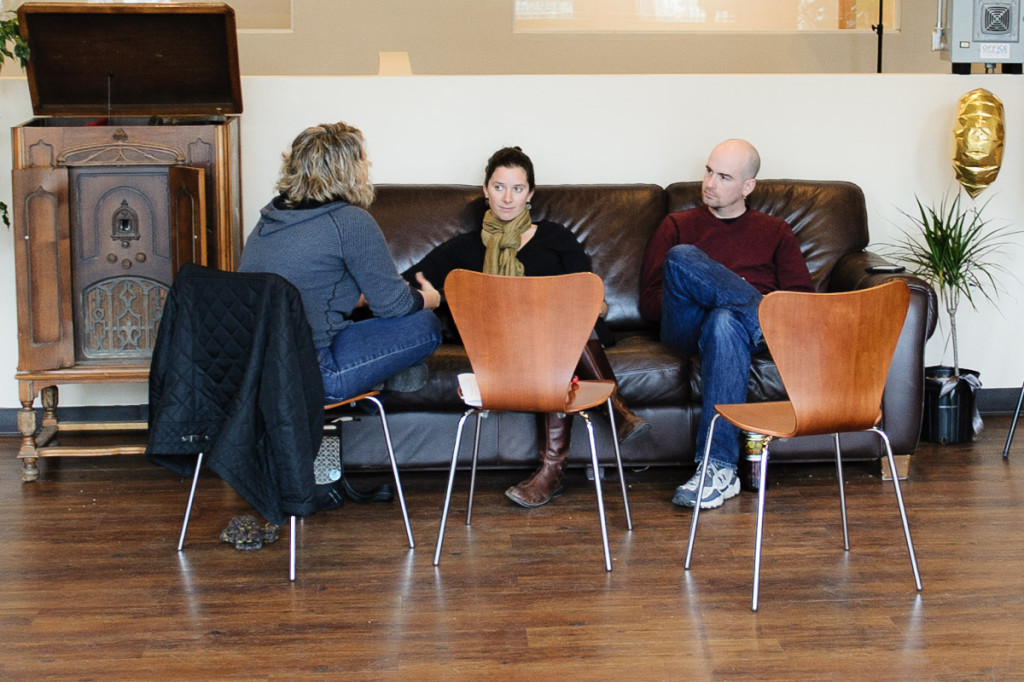
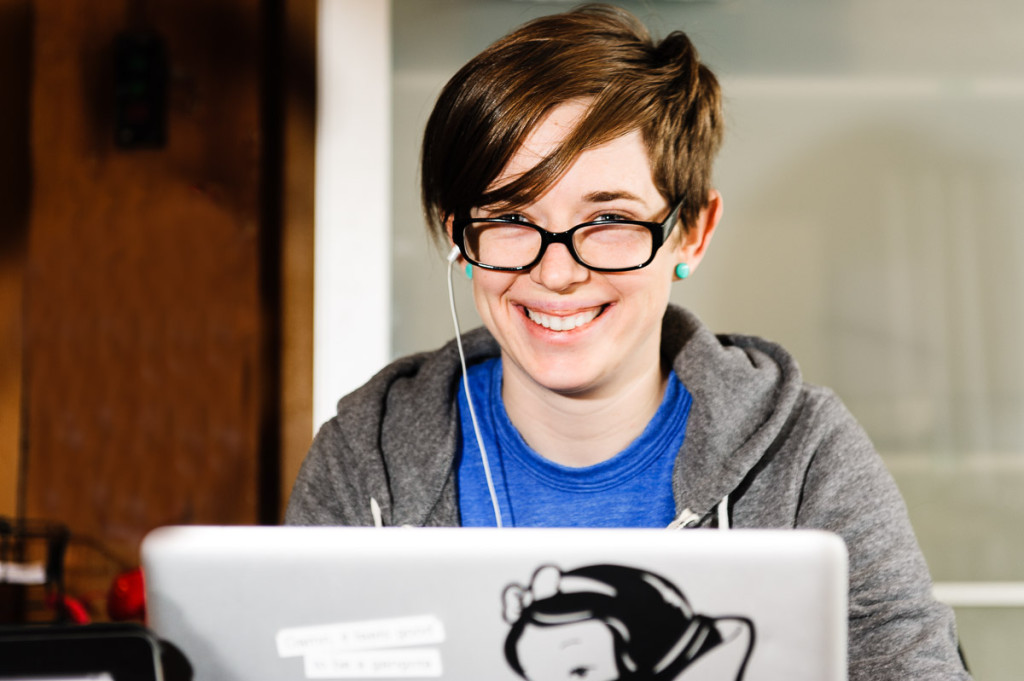
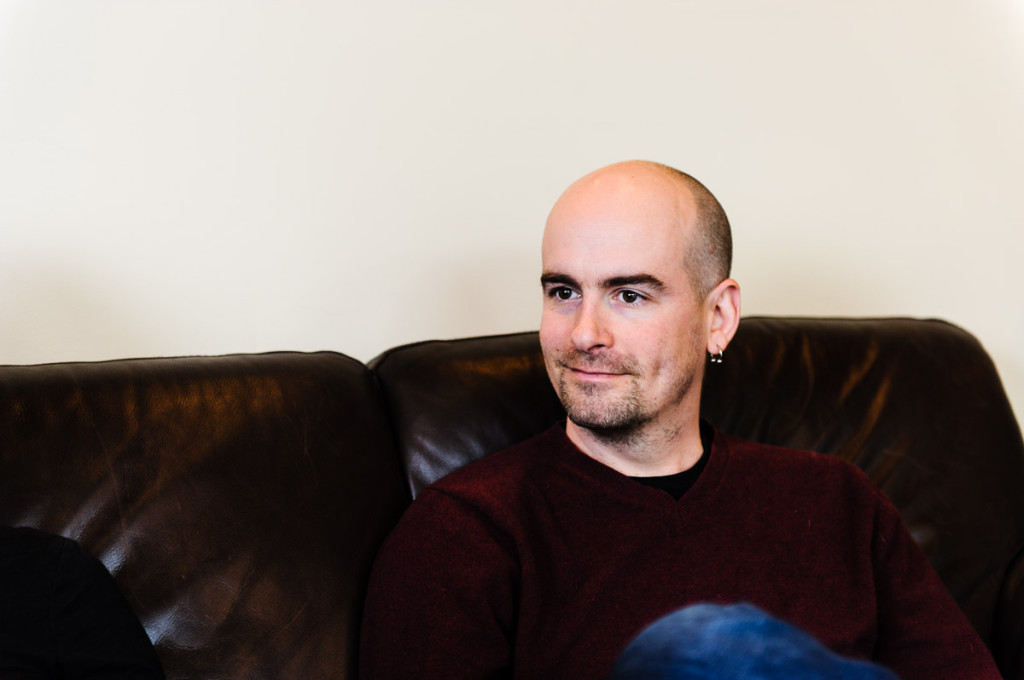
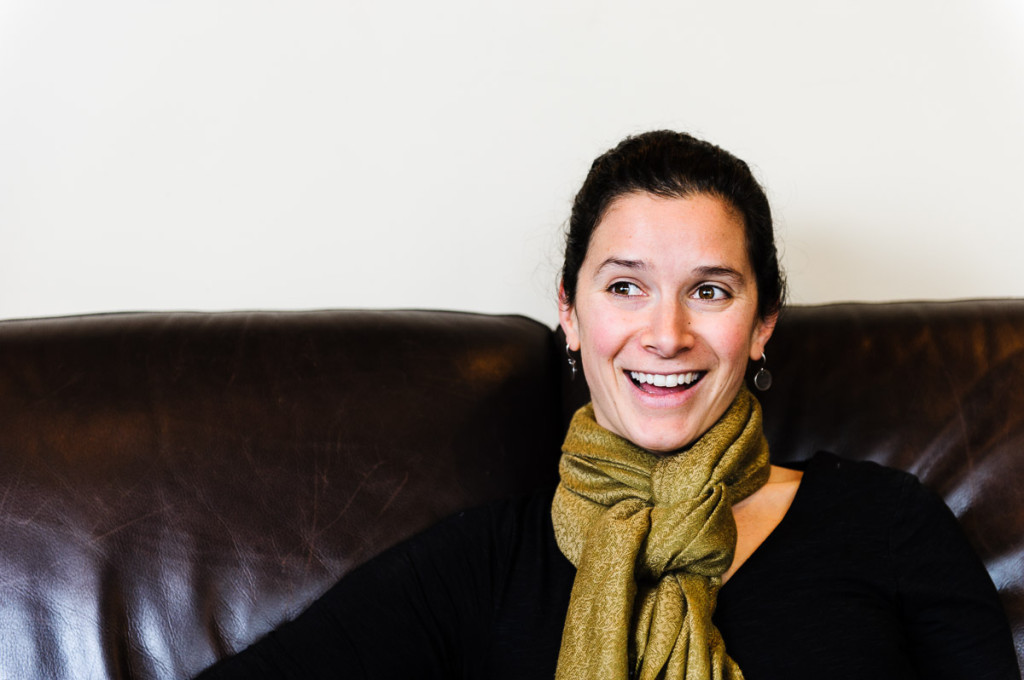
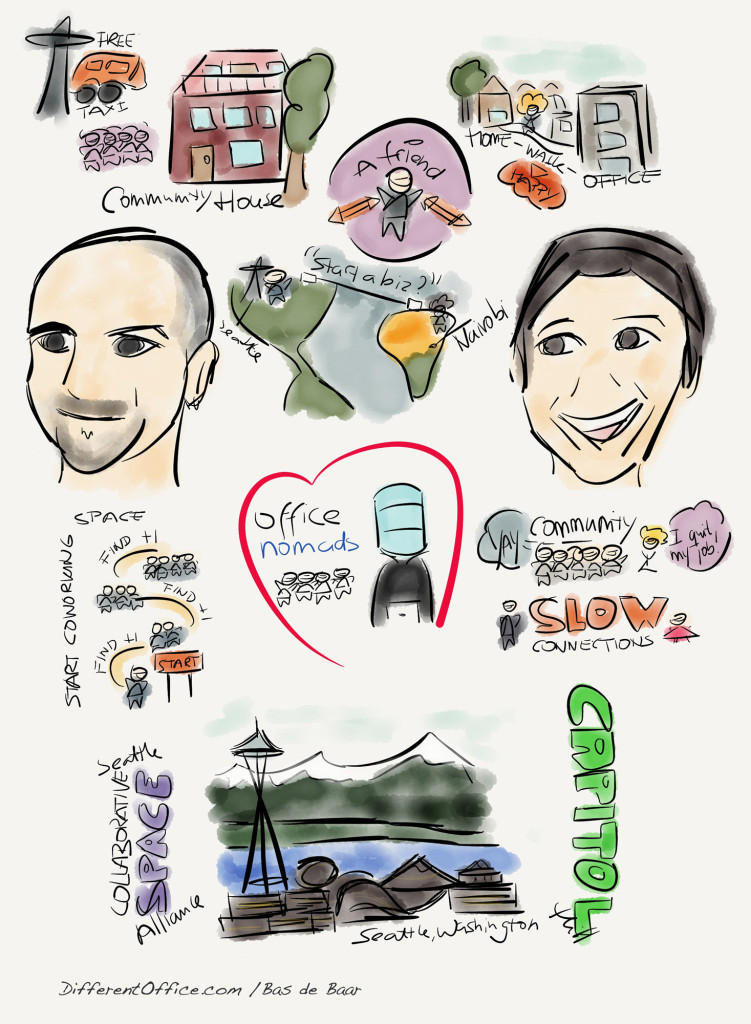
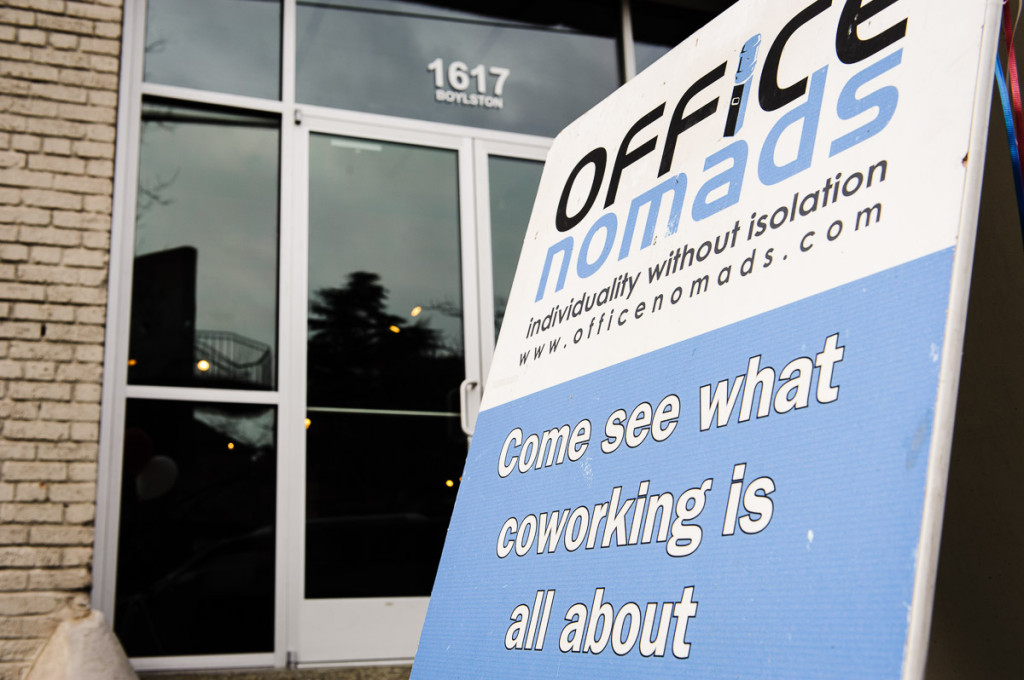
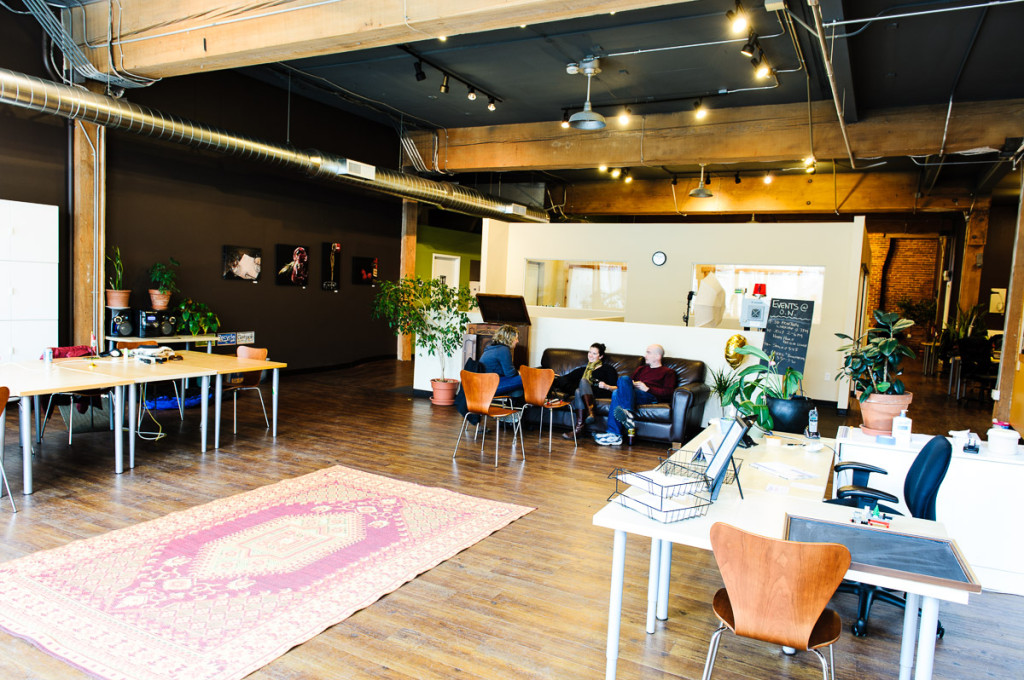
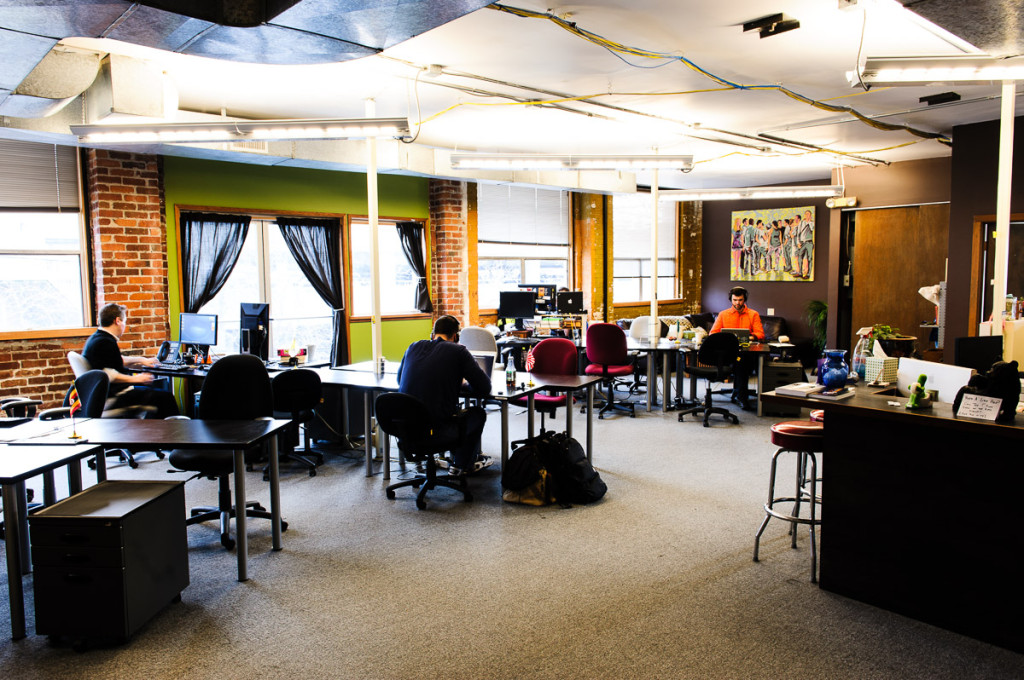
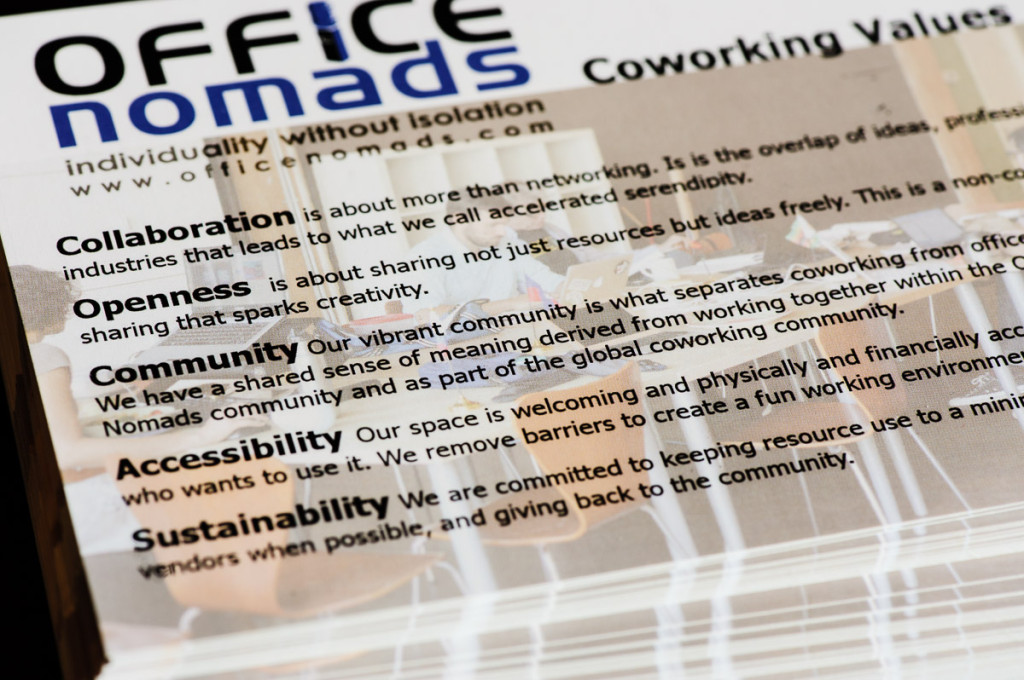
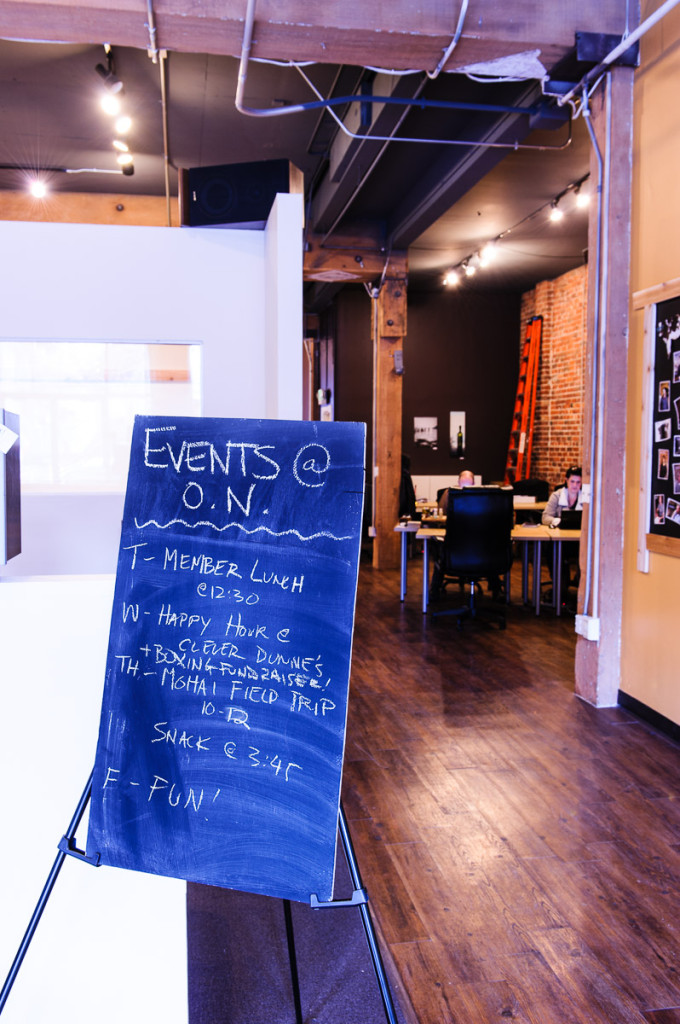
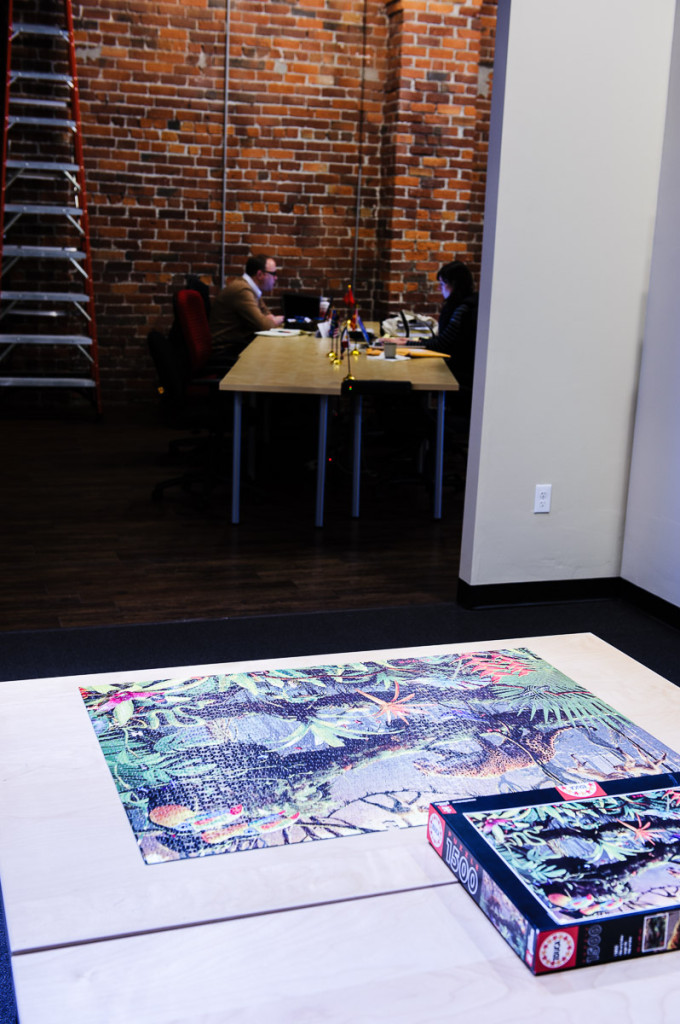
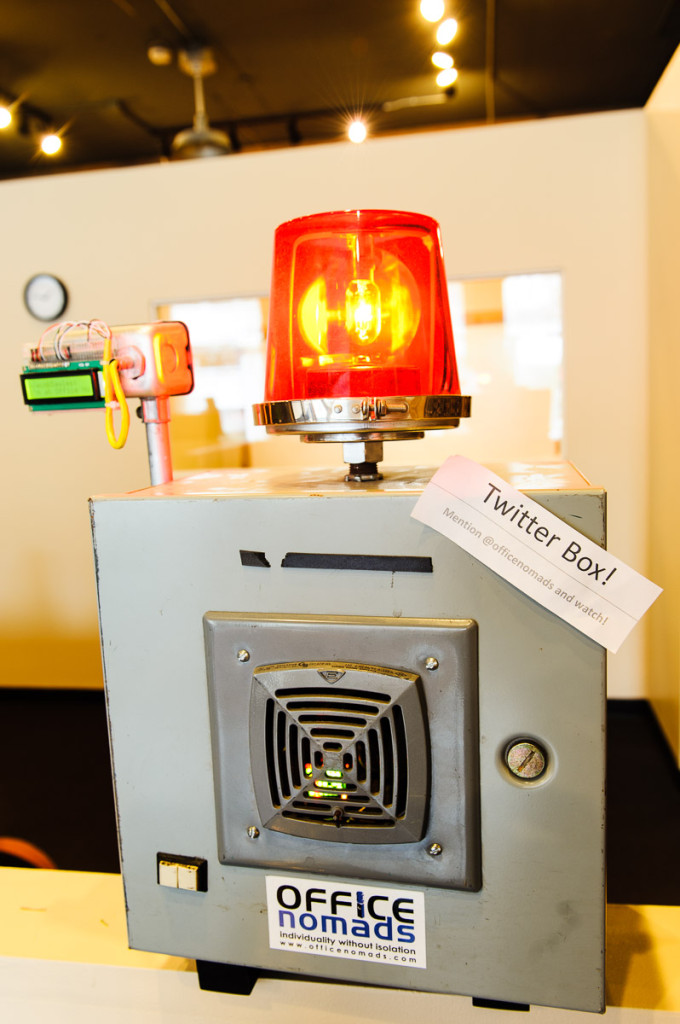
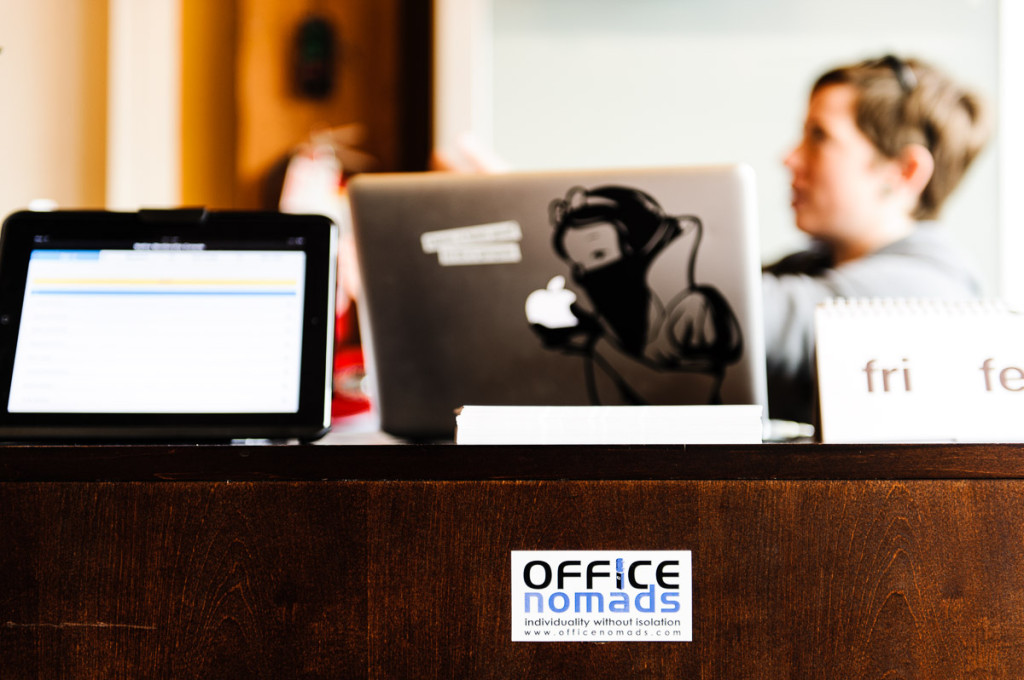
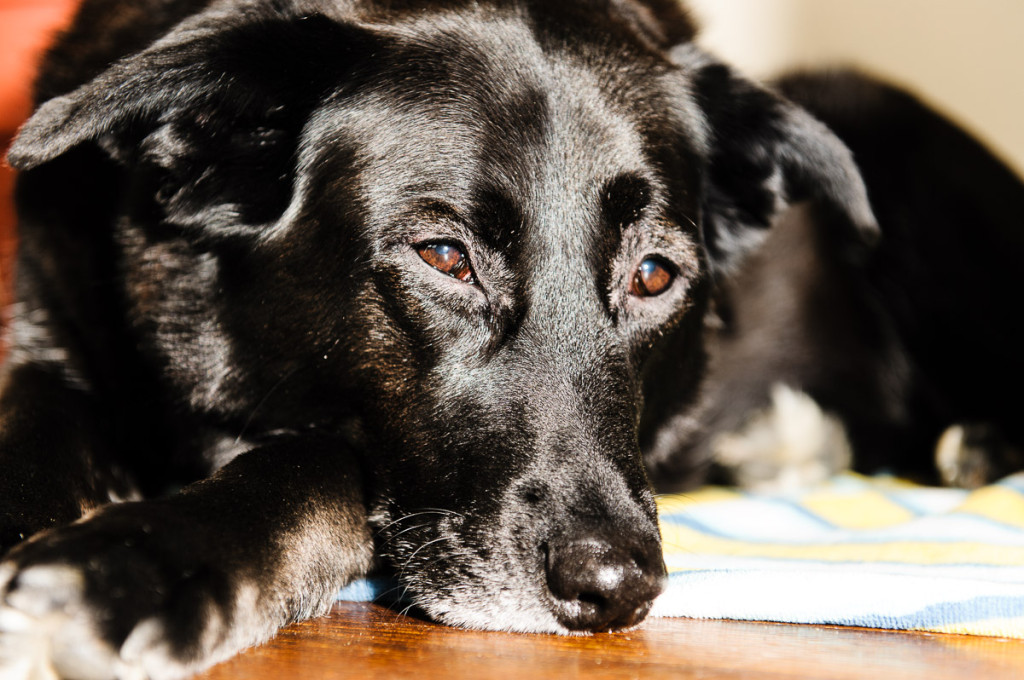
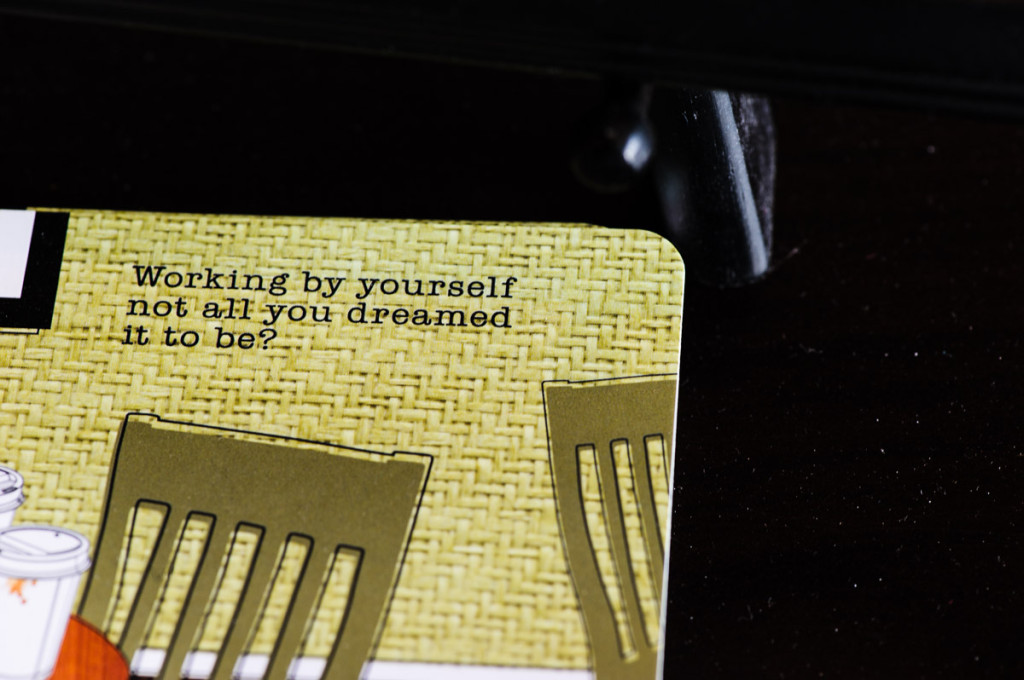
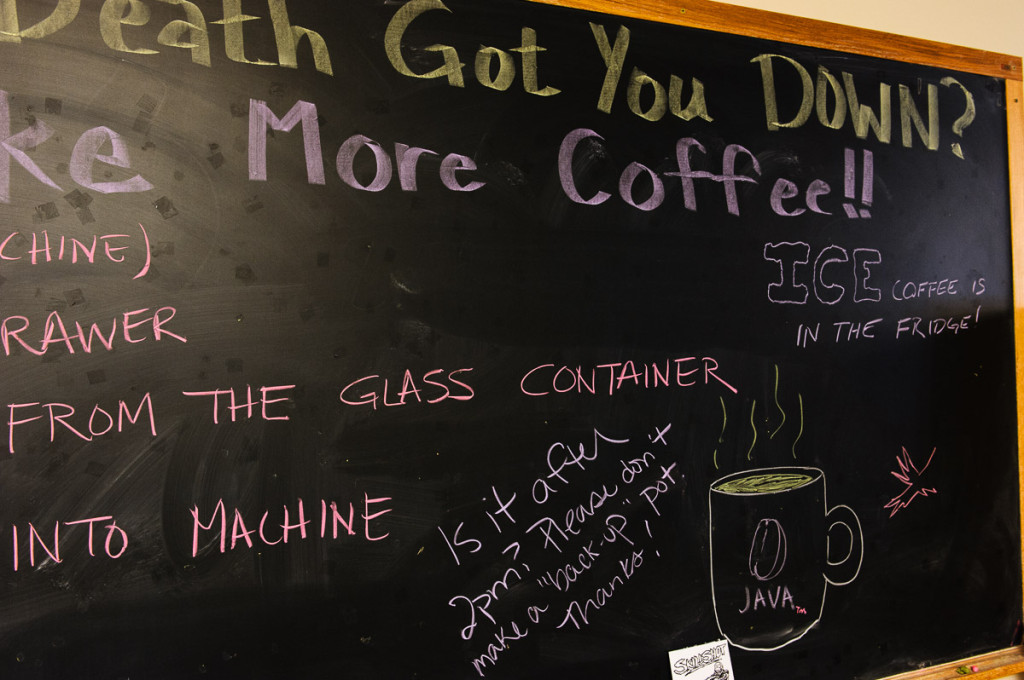
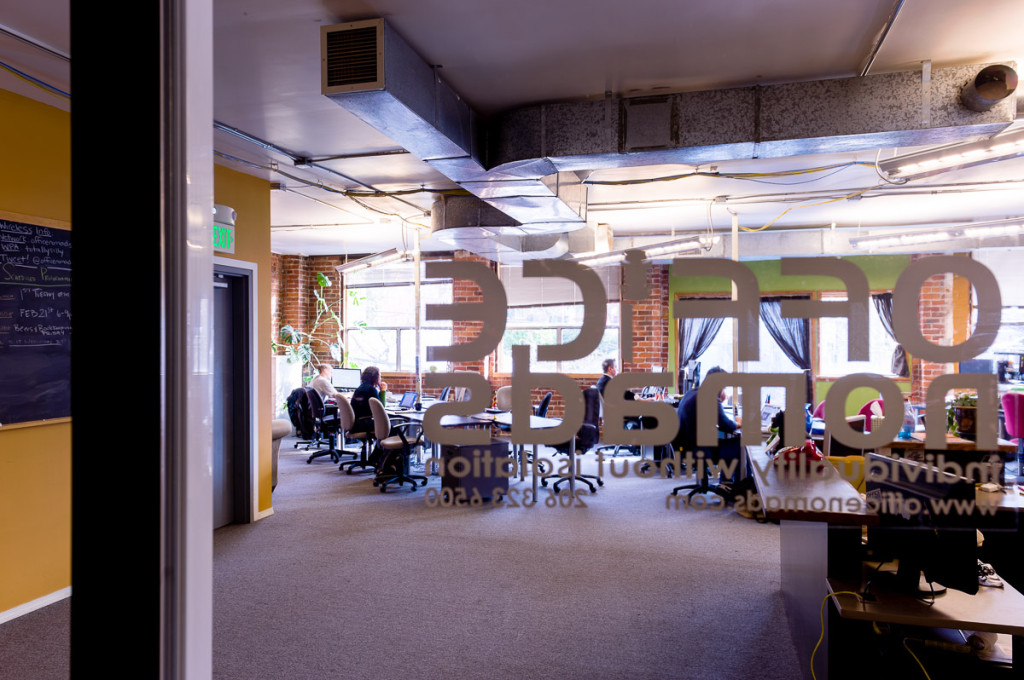
5 responses to “The People Are the Space”
[…] cave” The end! To see some of Bas’ doodle artwork, visit Shinkonia.com and Different Office. To see us have more of these work meetings on the fly, or to hear more about Batman and Sock […]
google…
Google http://www.google.com…
[…] The last interview we did was with Susan and Jacob of Office Nomads, a coworking space over on Boylston and Pine, and they said “The people are the […]
[…] In the spring, we interviewed Jacob and Susan of Office Nomads. The last question we usually ask is “When you hear ‘self-created, soul-satisfying work […]
[…] cave” The end! To see some of Bas’ doodle artwork, visit Shinkonia.com and Different Office. To see us have more of these work meetings on the fly, or to hear more about Batman and Sock […]